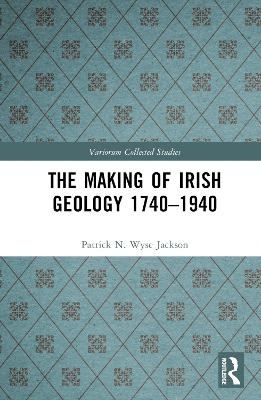
The Making of Irish Geology 1740–1940
Routledge (Verlag)
978-1-032-75768-1 (ISBN)
- Noch nicht erschienen (ca. April 2025)
- Versandkostenfrei innerhalb Deutschlands
- Auch auf Rechnung
- Verfügbarkeit in der Filiale vor Ort prüfen
- Artikel merken
Through a series of twenty-two papers, this volume provides syntheses and analyses of aspects of this geological research and places the role of a number of individuals firmly within context. The topics discussed include the considerations of the nature of igneous rocks, aspects of geological mapping of the country, the role played by Irish scientists in determining the age of the Earth, and the importance of early mineralogical and geological collectors and the role their collections made to advancing geological knowledge both in Ireland and Europe.
The Making of Irish Geology 1740–1940 will appeal to both the general and academic reader interested in the development of the geological sciences, with a particular focus on Ireland.
Patrick N. Wyse Jackson is a Professor in Geology and Fellow at Trinity College Dublin and a Member of the Royal Irish Academy. His work in the history of geology has focused largely on Ireland and on biographical studies of the major contributors to the science. He has published widely in national and international journals; his books include The Chronologers’ Quest: the search for the age of the Earth (2006) and the edited volume Four Centuries of Geological Travel (2007). He is a member of the International Commission on the History of Geological Sciences (INHIGEO).
Introduction
Review of the history of geology in Ireland
1 Fluctuations in Fortune: Three Hundred Years of Irish Geology.
In J. Wilson Foster and H. Chesney (eds.) Nature in Ireland. Lilliput Press, Dublin, pp. 91–114.
1700-1800s
2 Tumultuous times: geology in Ireland and the debate on the nature of basalt and other rocks of north-east Ireland between 1740 and 1816.
In P.N. Wyse Jackson (ed.) Science and Engineering in Ireland in 1798: a time of revolution. (2000). Royal Irish Academy: Dublin, pp. 35–49.
3 The fossil fishes of Bolca and the travels in Italy of the Irish cleric George Graydon in 1791. Museologia Scientifica 4 (1-2) (1995), 57–81 (with Ezio Vaccari).
4 Richard Kirwan (1733–1812): Chemist and Geologist.
Irish Chemical News 12(1) (1998), 36–39.
5 William Henry Fitton (1780–1861) and the Wollaston Medal of 1852. Geoscientist 8(10) (1998), 9.
6 William Smith and Ireland: sources of Irish geological information on his geological map of 1820.
Earth Sciences History 35(1), (2016), 115–123.
7 Alexander Nimmo’s On the Application of the science of Geology to the purposes of Practical Navigation (1825): an early investigation on the nature of offshore geology.
Earth Sciences History 15 (1996), 167–171.
8 John W. Pringle (c. 1793-1861) and Ordnance Survey geological mapping in Ireland.
Proceedings of the Geologists’ Association 108 (1997), 153–156.
9 Sir Richard John Griffith (1784–1878): a portrait in oils by Stephen Catterson Smith (1806–1872).
Irish Journal of Earth Sciences 26 (2008), 45–51.
10 Frederick M‘Coy (c. 1823–1899): an eminent Victorian palaeontologist and his synopses of Irish palaeontology of 1844 and 1846.
Geology Today 10 (1994), 231–234 (with Nigel T. Monaghan).
11 Patrick Ganly (1809–1899) and the discovery of evidence of way-up in rocks on the Dingle Peninsula.
The Kerry Magazine 7 (1996), 8–9.
12 A letter from William Bookey Brownrigg to Thomas Henry Huxley, dated 29 November 1865, authorising him to describe his fossil vertebrates from Jarrow Colliery, Co. Kilkenny and giving details of his find.
Irish Journal of Earth Sciences 29 (2011), 19–22 [with Migue de Arce and Nigel T. Monaghan].
13 Servants of the Raj at play: an example of the social interactions between a geologist and an engineer in nineteenth century India.
The Compass 81 (1-4) (2008), 96–103.
14 William Hellier Baily (1819-1888): forever an Acting Palaeontologist with the Geological Survey of Ireland. The Geological Curator 9(2) (2009), 57–84 (with Matthew A. Parkes).
15 William Thomson’s Determinations of the Age of the Earth. In R. Flood, M. McCartney and A. Whitaker (eds) Kelvin: Life, Labours and Legacy. Oxford University Press, 2008, pp. 169–174.
1900s
16 History of Ichnology: John Joly (1857–1933) on Oldhamia: Poetic and Scientific Observations. Ichnos, 18 (2011), 209–212.
17 John Joly (1857-1933) and his determinations of the age of the Earth.
In C.L.E. Lewis and S.J. Knell (eds). 2001. The Age of the Earth: from 4004 BC to AD 2002. Geological Society Special Publications, 190 (2001), 107–119.
18 Grenville Arthur James Cole (1859–1924) the cycling geologist.
In P.N. Wyse Jackson (ed.) Four Centuries of Geological Travel: The Search for Knowledge on Foot, Bicycle, Sledge and Camel. Geological Society, London, Special Publications, 287 (2007), 135–148.
19 Erratics, intrusions and graptolites.
In M. Mulvihill (ed.) Lab Coats and Lace: the lives and legacies of inspiring Irish women scientists and pioneers. WITS, Dublin (2009), pp. 48–59.
Geological Collections
20 Geological museums and their collections: rich sources for historians of geology.
Annals of Science 56 (1999), 417–431.
21 The Honorable George Knox (1765–1827) parliamentarian and mineral collector.
The Mineralogical Record 37(6) (2006), 543–551.
22 Sir Charles Lewis Giesecke (1761–1833) and Greenland: a recently discovered mineral collection in Trinity College, Dublin.
Irish Journal of Earth Sciences 15 (1996), 161–168.
References
| Erscheint lt. Verlag | 17.4.2025 |
|---|---|
| Reihe/Serie | Variorum Collected Studies |
| Zusatzinfo | 37 Halftones, black and white; 37 Illustrations, black and white |
| Verlagsort | London |
| Sprache | englisch |
| Maße | 156 x 234 mm |
| Themenwelt | Geisteswissenschaften ► Geschichte ► Regional- / Ländergeschichte |
| Naturwissenschaften ► Geowissenschaften ► Geologie | |
| ISBN-10 | 1-032-75768-X / 103275768X |
| ISBN-13 | 978-1-032-75768-1 / 9781032757681 |
| Zustand | Neuware |
| Informationen gemäß Produktsicherheitsverordnung (GPSR) | |
| Haben Sie eine Frage zum Produkt? |
aus dem Bereich


